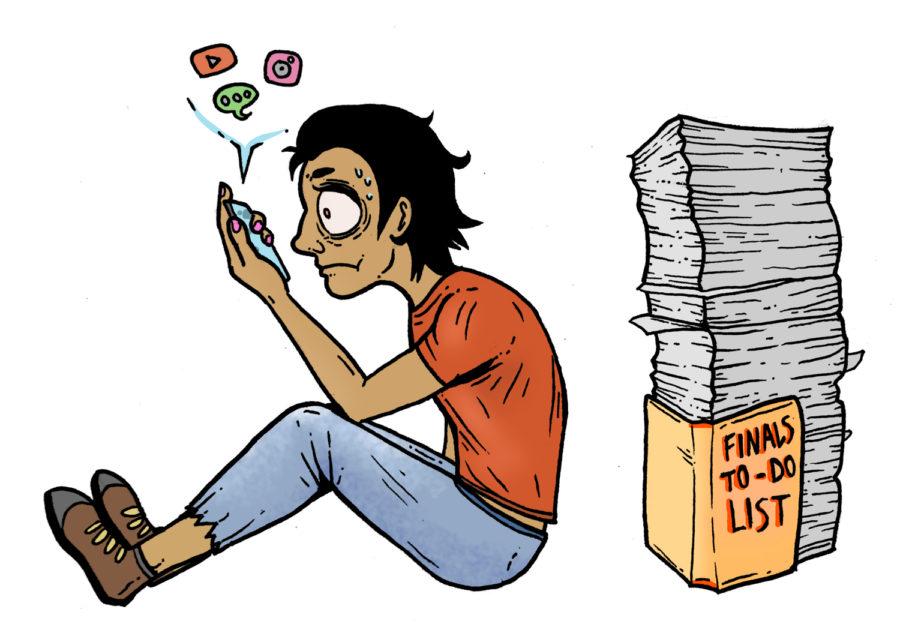Students and faculty examine procrastination cures
December 9, 2018
Everyone has done it. One look at the crowds in Hillman Library during finals week is all the proof anyone needs.
Cramming, the art of procrastinating until right before a final exam, followed by trying to stuff as much information into your head as possible in those last few hours, is a time-honored tradition at every college. But why do it, especially when many experts believe it is an ineffective way of studying?
Psychologically speaking, it’s a combination of several factors, according to Scott Fraundorf, an assistant professor of psychology at Pitt.
“One reason we may procrastinate in studying is that we often judge our learning based on what feels easy right now, so we don’t recognize how ineffective it is to cram the night before an exam,” Fraundorf said in an email.
Another rationale is that it is difficult for students to plan for the future. In psychological terms, this is called perspective taking, according to Fraundorf.
“It’s easy to say ‘I will have plenty of time to do that assignment later’ when the due date is weeks away,” he said in an email. “It is hard to anticipate all of the distractions (hanging out with friends, sleeping in, etc.) that might come up later and how compelling they will feel in the moment.”
It might be too late for this semester, but Fraundorf recommends that students who are accustomed to cramming change their studying habits as soon as possible and instead take up the method of “distributing practice.”
“In the long run, spreading your study over time — what psychologists call ‘distributed practice’ — is more effective than cramming. Distributing practice over time requires a lot of effort, so we don’t realize how much we would learn from it. It doesn’t feel like we are learning,” Fraundorf said in an email.
For students like Nick Yerger, a sophomore studying emergency medicine, the technique of distributed practice is something he tries to observe, but ultimately gets put on the backburner until there is only time left to cram. Yerger was studying for his organic chemistry final on the first floor of Hillman Saturday. Because there is no instant gratification from studying, it is tough for the sophomore to get started.
“The fact that there isn’t a crunch time made me feel that it was OK to push [work] off. I tried to fix the problem by allowing myself one hour to study and then a 15 minute break to be on my phone, but even that eventually led me to cram material when it came down to the wire,” Yerger said.
Many Pitt students, like Yerger, gravitate toward the library during finals week. For a multitude of reasons, such as the open atmosphere, big tables and lots of room to work, many consider it the best place to cram on campus.
“What I really like about the library is that it minimizes my distractions,” Yerger said. “In my room, I have countless different options that prove themselves much more interesting than getting work done.”
He has plenty of company, especially during finals week. Behind midterms it is the second busiest time of the semester, according Diana Dill, the University Library System’s instructional designer.
On average, the library saw 5,010 visitors a day this semester, Dill said. On Tuesday, Dec. 4, there were 8,474 — nearly a 70 percent increase.
With her office in the library, this overwhelming week transforms the normally sedate environment.
“Just as anecdotal evidence, I have seen people come in with pillows because they were staying so long,” Dill said in an email. “Also, on the second floor, where I am, the levels of sound really pick up during finals week, especially in the afternoon.”
This busy time in the library does not go over well with all students. Some, like John Kelly, a junior studying mechanical engineering, steer clear of the overpacked library in favor of other, quieter places to get their work done during finals week.
“There are too many people in one room for me to focus, it never really made sense to me,” Kelly said. “Why would I go study in a room full of people when I have my own room to myself at home, or can find somewhere smaller like Benedum or Posvar where there is not so many people in one room?”
Kelly still procrastinates and ends up cramming for tests though — it just doesn’t take place in the Hillman Library.
“I generally start studying early a little bit, but don’t really have any sense of urgency so I don’t focus well. As deadlines and exams approach, it gets more urgent and I start to focus. Ideally, I would study earlier,” Kelly said.“I try to, it just doesn’t work out.”
Although cramming isn’t the best method for real, long-term learning and retention, it may have some benefits.
“Cramming can help when you only need to retain information for a very short span of time,” Fraundorf said in an email.
If students do fall into the perpetual loop of procrastination, Fraundorf has advice to get you through the toughest week of the year — though ultimately, he still frowns on cramming.
“My best recommendation is not to cram — space your studying out over several days,” he said. “But, if you are going to cram, it is best to do right before your exam.”



